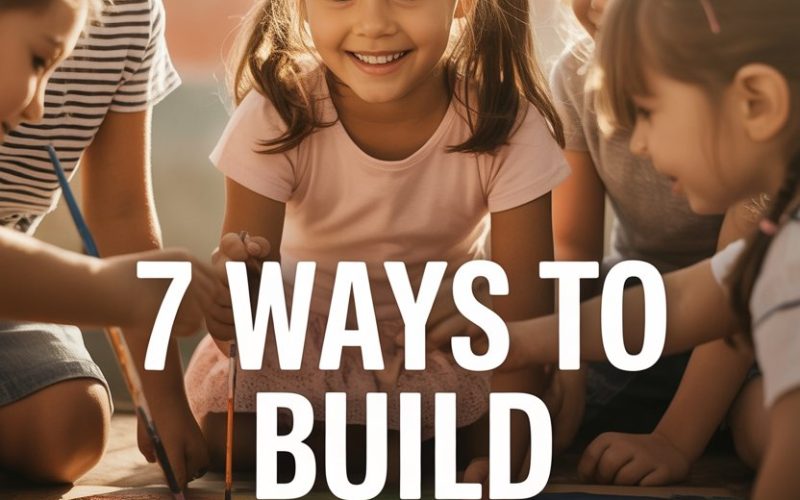Some kids burst into a room like they’ve just been told there’s free cake. Others, not so much.
If your child tends to hang back, clinging to your leg and eyeing the world from beneath a fringe, you’re not alone.
Plenty of brilliant, thoughtful humans start out shy. The trick isn’t to turn them into something they’re not—it’s to help them find the courage to show the world who they are.
Busy parents, this is for you: simple, doable ways to help your shy child grow in confidence (without adding yet another complicated parenting ritual to your plate).
1. Celebrate Small Wins
Building confidence doesn’t come from grand gestures or public speeches—especially not for kids who’d rather eat Brussels sprouts than speak in front of a crowd.
Spot the tiny triumphs: answering a question in class, greeting the neighbor’s dog, or ordering their own ice cream. Point them out (“I noticed you smiled at Mrs. Patel today!”), and watch your child swell with pride.
According to psychologist Dr. Eileen Kennedy-Moore, focusing on effort and bravery (not just results) can increase resilience and self-esteem.
Even if your child only manages a half-whispered “hello,” that’s a BIG deal for them.
2. Make Room for Quiet Strengths
Not everyone needs to belt out show tunes or lead the football team. Sometimes, the quietest children have the sharpest eyes, the keenest observations, or the wildest imaginations.
Notice what your child does well—art, building, puzzles, reading, inventing. Find ways for them to shine, even if it’s not flashy.
This might mean hanging their latest drawing on the fridge, entering a Lego contest, or sharing a funny story at dinner.
Research from the Child Mind Institute suggests that valuing children’s strengths (instead of pushing them to be outgoing) helps them feel accepted and secure.
3. Model Confident Behavior (With a Hint of Humility)
Kids are expert mimics. They’ll catch you sneaking chocolate before dinner, and they’ll catch the way you handle awkward social moments, too.
If you make a mistake—maybe you stumble over a greeting or drop your bag in public—laugh it off. Model what it looks like to be kind to yourself. Tell your child, “Well, that was embarrassing, but everyone does awkward things sometimes!”
Bonus points if you can make a joke out of it.
Seeing you navigate social situations with a sense of humor and perspective gives your child permission to do the same. You don’t have to pretend you’re never nervous (you’re not a robot, after all). You just need to show that it’s survivable.
4. Structure Social Practice, Not Pressure
Would you feel ready to run a marathon without ever jogging around the block? Social confidence works the same way: it builds with practice.
Set up low-pressure playdates or invite a friend over for a shared activity—baking biscuits, painting, building a blanket fort. Shared tasks help distract from the “what do I say?” panic.
If your child freezes in groups, start smaller.
Sometimes a cousin, grandparent, or even a pet can be a great first “audience.” Dr. Mary Rooney, a clinical psychologist, notes that practice in safe settings helps kids stretch their comfort zones bit by bit.
Just remember: avoid shoving your child into the deep end. “Go play!” at a massive birthday party can feel like being thrown to the wolves. Think toe-dipping, not cannonballs.
5. Rehearse Tricky Situations
Social situations can feel like improv theatre for shy kids—except nobody gave them a script.
Help your child “rehearse” tricky moments. You might role-play introducing themselves, joining a game, or asking a teacher for help.
Keep it light and silly: “Let’s pretend you’re meeting the Queen. What would you say?”
Practicing these moments at home gives your child a sense of what to say and do when it counts. Social scripts are a lifesaver. Eventually, the training wheels come off and their confidence grows.
And if you need backup, a visual schedule or social story (complete with stick-figure doodles) can help kids who prefer to see things mapped out. (Pinterest is a goldmine for printable social stories.)
6. Watch Your Labels
“She’s just shy.” It slips out so easily, especially when well-meaning strangers are waiting for a response and your child is hiding behind your knees.
Problem is, labels can stick tighter than dried Weetabix.
If your child hears this enough, they might start to believe that’s the whole story. Instead, try: “She likes to get to know people before chatting,” or “He’s thinking about what to say.”
Experts from the American Academy of Pediatrics recommend avoiding fixed labels and focusing on traits and preferences instead. Your child is more than a one-word summary.
7. Teach Self-Compassion and Mindfulness
Even the most outgoing kids get nervous or embarrassed. The difference? Confident kids bounce back without spiralling into self-doubt.
Show your child how to be gentle with themselves. If something doesn’t go as planned, talk about mistakes as opportunities to learn. (If you need a good example, there’s always your latest attempt at sourdough.)
Simple mindfulness exercises can also help. Try a short “breathing game” before school—three deep breaths together, like you’re blowing up the world’s biggest imaginary balloon.
Apps like Smiling Mind offer short meditations tailored to kids. Over time, this helps them manage anxiety and build an inner voice that’s more cheerleader than critic.
Growing Confidence, One Small Step at a Time
You don’t need to turn your child into the next class president. Confidence isn’t about being loud or fearless; it’s about trusting themselves enough to try, even if their hands are shaking a little.
Every small step counts. Every time your child peeks out from behind your legs, gives a tiny wave, or cracks a smile, that’s progress.
Your patient encouragement—and the odd well-timed biscuit—will help them find their footing at their own pace.
Keep cheering them on. That shy sparkle? It’s full of promise.




